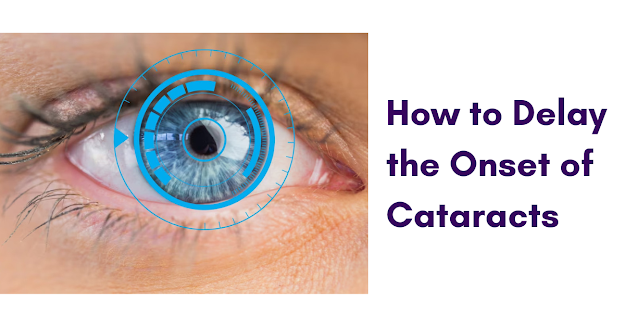How to Delay the Onset of Cataracts?
Eat a healthy diet
Eating a balanced diet is one of the best ways to prevent and delay cataracts from developing. Eating plenty of fruits, vegetables, and omega-3 fatty acids can help keep your eyes healthy. Leafy greens, such as kale and spinach, are especially beneficial for eye health because they contain lutein and zeaxanthin, two antioxidants that help protect the eye.
Carrots are also great for vision, as they contain beta-carotene which helps protect the eyes against damage. Eating plenty of whole grains, such as quinoa and brown rice, is also beneficial for eye health as they contain fiber, B vitamins, and other important nutrients. Eating a variety of healthy proteins, such as fish and nuts, is also important. Omega-3 fatty acids found in salmon and other fatty fish can help protect the eyes from age-related conditions like cataracts. In addition to eating a healthy diet, it is also important to get enough sleep every night to help keep your eyes healthy.
Exercise regularly
Exercising regularly is important for your overall health, and it can help delay the onset of cataracts as well. Exercise helps keep your blood pressure and sugar levels stable, both of which can help reduce the risk of developing cataracts. Additionally, regular exercise may reduce oxidative stress, which is associated with the development of cataracts.
You don’t have to engage in intense physical activity to reduce your risk of developing cataracts.
Moderate-intensity activities such as walking or swimming are all beneficial. Exercise for even a short time each day can have a positive impact. Additionally, if you enjoy outdoor activities, be sure to wear protective eyewear to protect your eyes from the sun’s UV rays.
If you’re looking for ways to slow the progression of cataracts, incorporating regular exercise into your way of life is a great place to start.
Protect your eyes from UV rays
The sun’s ultraviolet (UV) radiation can damage the delicate structures of your eyes, leading to cataracts. To protect your eyes from UV radiation, you should always wear sunglasses that have 100% UV protection when you are outdoors. Look for sunglasses that block both UVA and UVB rays, and make sure that the lenses are large enough to cover the entire area around your eyes. Wearing a wide-brimmed hat can also help to keep your eyes safe from UV radiation.
When buying new glasses, it’s important to remember that regular eyeglasses do not necessarily provide enough protection from UV radiation. Ask your optometrist if they offer lenses with a built-in UV filter, or consider getting a separate pair of sunglasses. Additionally, you should always avoid looking directly at the sun, as even a few seconds of direct exposure can permanently damage your vision.
Taking steps to protect your eyes from UV radiation can help to slow down the progression of cataracts. Wear sunglasses and hats when you go outside, and be sure to get a pair of glasses with a UV filter if you wear regular eyeglasses. Doing so will give your eyes the best chance of staying healthy and clear for years to come.
Don't smoke
Smoking can increase your risk of developing cataracts, as well as other serious eye diseases. The toxins in cigarettes can damage the delicate tissues in the eyes, leading to vision problems and even blindness. Studies have also shown that smoking increases your risk of developing macular degeneration, which can lead to severe vision loss.
If you are a smoker, quitting is one of the best ways to reduce your risk of developing cataracts and other eye diseases. Talk to your doctor about different methods to help you quit smoking and make sure to follow their advice. If you don't smoke, avoid secondhand smoke to reduce your chances of developing cataracts.
Get regular eye exams
Eye exams are one of the most important steps you can take to slow down the progression of cataracts. An eye exam can detect early signs of cataract development and your optometrist can advise you on the best ways to manage them. Your optometrist can also prescribe special lenses that are designed to reduce the effects of cataracts and help you to maintain better vision.
During an eye exam, your optometrist will check your eyes for signs of cataracts, such as clouding of the lens or yellowing of the pupils. The optometrist may also use a slit lamp to assess your eye’s ability to focus and adjust to light. If your optometrist detects any signs of cataracts, they may recommend that you see an ophthalmologist for further evaluation.
When Cataract operation is advised?
Your eye doctor will perform an exam to determine the severity of your cataracts and make a recommendation based on your individual case. If cataract surgery is suggested, it is important to have an understanding of the risks and benefits associated with the procedure. Your eye doctor will be able to provide detailed information and answer any questions you may have.
Overall, Cataract operation treatment in Coimbatore is generally safe and effective. With proper planning and preparation, you can trust that your vision will be restored and you can return to living life with greater clarity.




Comments
Post a Comment